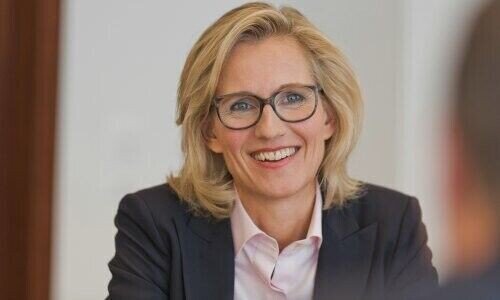The first female CEO of UBS’ $760 billion Swiss arm faces stagnant profits as a raft of nimble digital upstarts lurk. Two of the last three executives in the job didn't last long.
The promotion of Sabine Keller-Busse to run UBS’ domestic bank is tantamount to admitting that the Swiss bank has catching up to do: she will be the fourth banker to run the heavyweight unit in six years when she takes over in February.
The Swiss business needs an overhaul: setbacks this year mean it is likely to sharply miss last year's 1.43 billion Swiss francs ($1.6 billion) in pre-tax profits. Of course the pandemic threw a spanner in the works for current chief Axel Lehmann: UBS booked several hundred million against dud loans so far this year.
Urgent Handover
UBS emphasizes it is still the Swiss market leader, meaning Lehmann isn't resigning due to a poor 2020. However, the urgency of his handover to Keller-Busse (pictured below) in just eight weeks is underscored by UBS' lack of replacement in her current job as operating chief (more on that later).

The 55-year-old’s appointment isn’t a surprise – in fact, it was surprising to many observers when Lehmann, and not she, won the job in 2018. The subtext of Friday’s promotion is that UBS isn’t happy about the unit’s profitability, at a time when the bread and butter of traditional banking is under attack from the likes of Revolut and N26.
Revenue and pre-tax profit at the UBS unit, largely retail clients and banking for businesses, moved sideways in recent years. Net interest margins have, of course, crumbled amid negative interest rates in Switzerland. Martin Blessing lasted less than two years before moving up and then out, while Lehmann was in the job for three.
Frothy Spending
Despite a years-long effort to counter this, UBS’ spending at home remains frothy: the unit’s cost-income ratio stood at 60.8 percent at the end of last year. What can Keller-Busse do? Previous CEO Sergio Ermotti shunned major job cuts in Switzerland, fearing (rightly) they would be viewed highly unfavorably at home.
Meanwhile, UBS has eschewed pouring money into directly challenging neobanks, as Credit Suisse has with the launch of CSX in September. Instead, UBS has partnered with reinsurer Swiss Re and Zurich Insurance on platforms to pipe its products to a wider consumer base.
What is Keller-Busse to do? The dual challenge is «managing costs,» likely through deeply unpopular job cuts at home, while ascertaining where to pour Switzerland’s share of UBS’ $3.5 billion in technology spending to spur growth.
Pandemic Strength
Technology is her forte: Keller-Busse shined in an evaluation of top executives, according to a German media report. She stepped up the last leg of a remote working program for most employees just as the lock-down began, she said in May.
If Keller-Busse has her work cut out for her at home, she has solid backing within UBS’ board: she worked closely with directors on top executive pay in her role as head of human resources until 2017. In that role, she demonstrated a supreme command for numbers.
Diplomacy Vs Impatience
She also quickly learned to soften her tone to a more diplomatic one with board members than with her staff, according to one person who has observed her career at close range for several years.
«She is a no-nonsense leader who demands results,» the person said. «She could be impatient if she didn’t get them.» Her dual roles – head of human resources as well as operating officer in Switzerland for three years – illustrates her effectiveness.
Keller-Busse, who is married to IBM Switzerland boss Christian Keller, is famously driven: she took over her family’s business when her father passed away, in between completing first a master's degree, then a PhD in business administration at St. Gallen prestigious HSG university (she ultimately coordinated a management buyout of her family's firm).
Another Woman To Follow?
She made partner at McKinsey at 36, before in 2008 heading for Credit Suisse. Keller-Busse ran the Swiss bank’s private clients business in Zurich until UBS poached her just two years later.
The only woman in UBS’ C-suite for a time, Keller-Busse isn’t a vocal flag-bearer for diversity. Ironically, her replacement in the operating job may be another woman: veterans like Emma Molvidson, Karin Oertli, and Sabine Magri are sure to be promising candidates.
Peter Hody contributed reporting



































